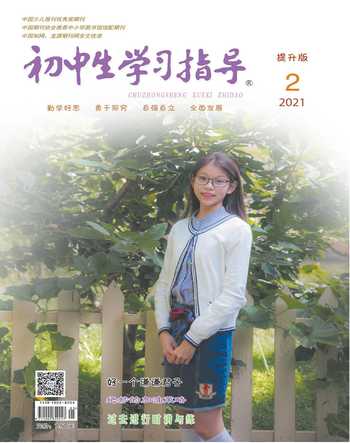你来问我来答
2021-09-10 07:22:44杨秀峰
初中生学习指导·提升版 2021年2期
杨秀峰 民进会员, 本溪市政协委员, 本溪市外语协会副秘书长, 本溪市英语角创始人,本溪市信息化骨干教师,本溪市实验中学八年级英语组组长。曾获得“辽宁省英语教师基本功大赛一等奖”“中国教育学会优质课大赛一等奖”等奖项。
Q1【問】
八年级下教材第四单元P27有一句话叫 Relations between my parents have become difficult.
请问此处relation为什么要加s呢?
表示人与人、国与国之间的关系时,通常用relations而不是relation。
Q2【问】
新目标八年级下第三单元有这样一段话:
Kids these days have enough stress from school. They do not have time to study and do housework, too.
请问在否定句尾不是应该用either吗?此处为什么用了too?
我们通常所说的在否定句的句尾用either,是指否定+否定形式用either。也就是说,在表达了否定意义之后,如果再作否定的补充,要用either。如:Peter isn’t here today. John isn’t here,either.
但是,如果是肯定+否定形式,则需要用also/ as well/ too。比如说:You can have an apple, but you can’t have an orange, too.(你可以吃一个苹果,那就不能再吃橘子了。)此处前半句表达了肯定意义,后半句作了否定的补充,所以词尾要用too。综上所述,教科书中用too而不用either是对的。
猜你喜欢
快乐学习报·教育周刊(2021年10期)2021-09-10 10:16:30
快乐学习报·教育周刊(2021年23期)2021-09-10 07:22:44
建筑与预算(2020年10期)2020-11-04 07:55:32
建筑与预算(2020年9期)2020-10-13 12:06:28
建筑与预算(2014年4期)2014-11-18 13:10:58
建筑与预算(2014年10期)2014-11-18 13:08:12
中国摄影(2013年5期)2013-04-29 00:44:03
金融博览(2008年7期)2008-08-18 09:14:04
金融博览(2008年6期)2008-07-11 10:17:00
37°女人(2008年2期)2008-03-31 08:48:02
- 初中生学习指导·提升版的其它文章
- 你了解自己吗
- 2月事记
- 手机创意摄影技巧
- 力的三要素易错题专练
- 力的作用是相互的
- 探究重力大小与质量的关系

